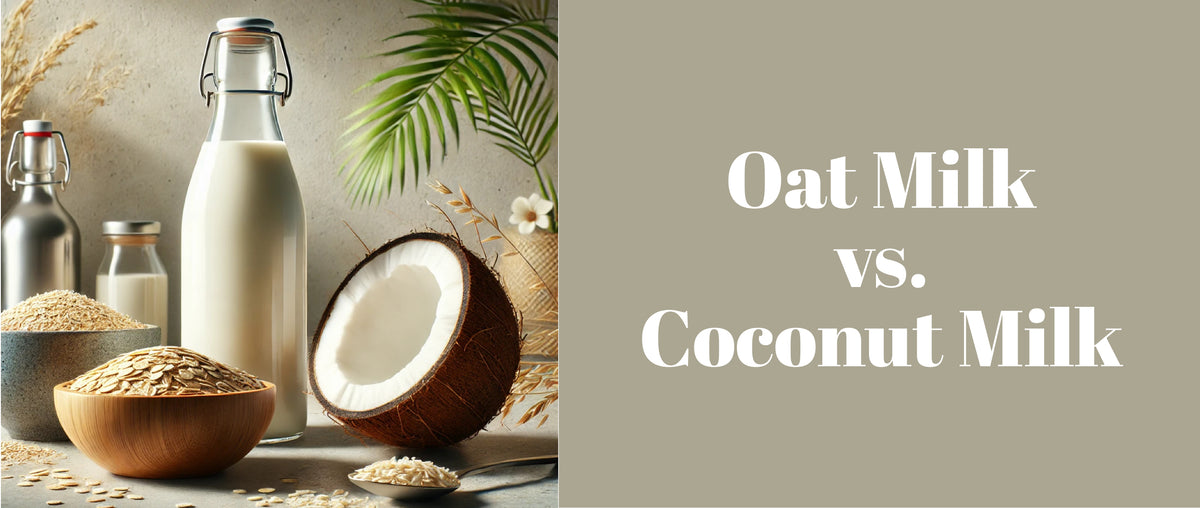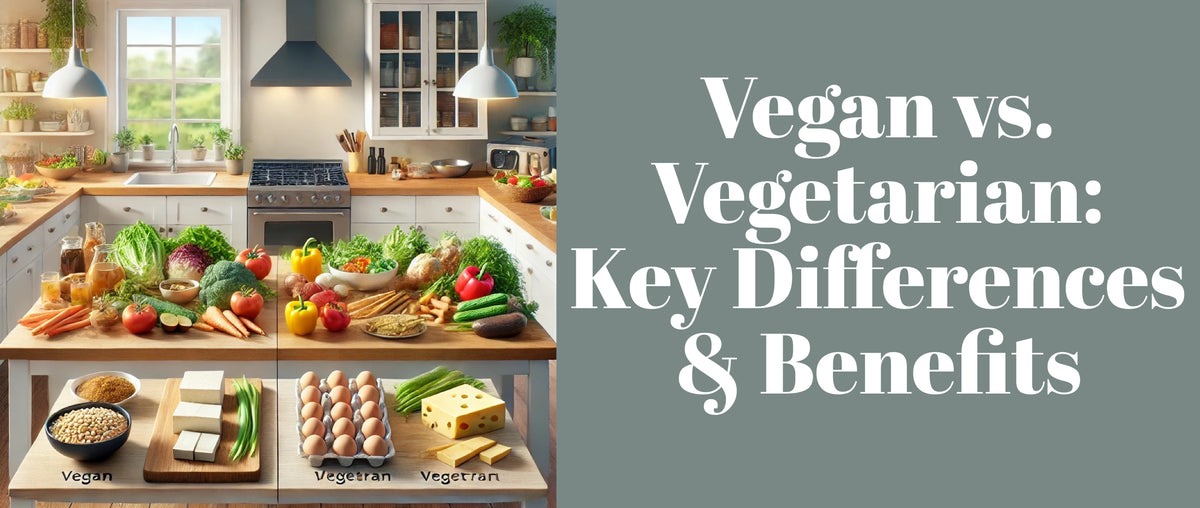Oat Milk vs. Coconut Milk
In the world of plant based milks, oat milk and coconut milk stand out as popular choices, each offering unique health benefits, flavors, and nutritional profiles. Choosing the right one depends on your dietary goals, preferences, and intended use—whether for coffee, smoothies, or vegan cooking.
In this article, we’ll take a deep dive into Oat Milk and coconut milk, comparing their nutritional value, health benefits, culinary uses, and sustainability. By the end, you’ll know which option best suits your healthy lifestyle and dietary needs.
Key Takeaways
- Oat milk and coconut milk differ in nutritional profile, with oat milk often containing more carbohydrates and fiber, while coconut milk provides healthy fats.
- Health benefits of each milk vary, with oat milk known for supporting heart health and coconut milk offering potential immune-boosting properties.
- Both milks have unique flavors and applications, ideal for vegan dishes, healthy smoothies, or even dairy-free desserts.
Nutritional Comparison of Oat Milk vs. Coconut Milk
When choosing between oat milk and coconut milk, it’s essential to understand the nutritional content of each. Here’s a detailed breakdown of each milk’s nutritional profile:
| Nutrient | Oat Milk (1 cup) | Coconut Milk (1 cup, unsweetened) |
|---|---|---|
| Calories | ~120 | ~45-60 |
| Carbohydrates | 16g | 2g |
| Fiber | 2g | <1g |
| Protein | 3g | <1g |
| Fat | 5g (mostly unsaturated) | 4.5g (contains MCTs) |
| Calcium | 25-35% DV (often fortified) | 10-15% DV |
| Vitamin D | 20-25% DV (often fortified) | 15% DV (often fortified) |
Key Differences:
- Carbohydrate and Fiber Content: Oat milk is rich in carbohydrates and contains a decent amount of fiber, making it more filling and ideal for healthy weight loss and energy.
- Fat Content: Coconut milk is known for its medium-chain triglycerides (MCTs), which are quickly metabolized and may aid in healthy living.
- Protein: Both milks have minimal protein, so if protein intake is a concern, you might want to add sources like Vegan products or plant-based cheese.

Health Benefits of Oat Milk and Coconut Milk
Both oat milk and coconut milk offer unique health benefits that make them appealing to individuals seeking a healthy lifestyle.
Health Benefits of Oat Milk
- Heart Health: Oat milk is high in beta-glucan, a soluble fiber known to help lower cholesterol, which can reduce the risk of heart disease.
- Liver Health: The antioxidants in oat milk, combined with its fiber content, may promote liver health, making it a good addition to a diet focused on liver healthy foods.
- Digestive Support: The fiber in oat milk promotes a healthy digestive system, and it can be a great base for a healthy smoothie recipe.
- Bone Health: Fortified oat milk often contains calcium and vitamin D, both essential for bone strength.
Health Benefits of Coconut Milk
- Immune Support: Coconut milk contains lauric acid, known for its antimicrobial and immune-supporting properties.
- Weight Management: The MCTs in coconut milk may help in healthy weight loss by promoting fat metabolism.
- Nutrient Density: Coconut milk is rich in magnesium, potassium, and electrolytes, which are beneficial for hydration and overall health.
- Digestive Health: Coconut milk’s healthy fats can support digestive function, making it a good addition to fat-free butter or a creamy Garlic Butter.
Culinary Uses of Oat Milk vs. Coconut Milk
Your choice between oat milk and coconut milk may also depend on your culinary needs. Here’s how they each stand out in cooking, baking, and beverages.
Best Uses for Oat Milk
- Coffee and Tea: Oat milk froths well and has a neutral taste, making it a favorite for lattes and teas.
- Baking: Its creamy texture and mild flavor make oat milk an ideal replacement for dairy in baked goods, particularly in recipes calling for milk.
- Smoothies and Breakfasts: With a bit of sweetness and fiber, oat milk adds creaminess to smoothies, oats, and cereals.
- Cheese Recipes: If you’re preparing recipes with plant based cheese , oat milk’s neutral taste pairs well with vegan cheese and other dairy-free products like Cashew Butter.
Best Uses for Coconut Milk
- Curry and Soups: Coconut milk’s rich, tropical flavor enhances the depth of dishes like Thai curries or vegetable soups.
- Dairy-Free Desserts: Coconut milk provides a creamy base for dairy-free ice cream, puddings, and smoothies, giving a decadent texture.
- Savory Dishes: For dishes needing richness, coconut milk works well in sauces and gravies.
- Vegan Butter Alternatives: Coconut milk pairs beautifully with unsalted butter for a vegan, creamy touch in recipes needing a dairy substitute.
Environmental Impact and Sustainability
Sustainability is a growing factor in choosing plant-based milks. Let’s explore how oat milk and coconut milk fare in terms of their environmental footprint.
Oat Milk’s Sustainability
- Lower Carbon Footprint: Oat milk production has a relatively low carbon footprint and requires significantly less water than almond or dairy milk.
- Resource Efficiency: Growing oats requires fewer pesticides and less land, contributing to a more sustainable agricultural process.
Coconut Milk’s Sustainability
- Harvesting Impact: Coconut farming is mostly concentrated in tropical regions, which can lead to deforestation if not managed sustainably.
- Labor Concerns: Some coconut farms rely on low-wage labor, so it’s essential to source coconut milk from ethical and sustainable brands.
Which Milk Should You Choose?
When deciding between oat milk and coconut milk, consider the following:
- For Heart Health: Oat milk is a better choice due to its beta-glucan content.
- For Weight Loss and Fat Metabolism: Coconut milk may be beneficial due to its MCTs.
- For Flavor: Coconut milk has a stronger, more distinct flavor, while oat milk is mild and versatile.
- For the Environment: Oat milk generally has a smaller environmental impact.
Also Read
Recipes Featuring Oat Milk and Coconut Milk
Both oat milk and coconut milk serve as versatile bases for vegan recipes. Here are a few ways you can use each type of milk to create delicious, nutritious dishes.
Recipes with Oat Milk
- Creamy Vegan Alfredo Pasta
- Ingredients: Oat milk, plant based cheese , garlic, nutritional yeast, and pasta.
- Instructions: Heat oat milk with garlic and unsalted butter for a rich, dairy-free Alfredo sauce. Add cooked pasta and mix in nutritional yeast and vegan cheese.
- Oat Milk Smoothie Bowl
- Ingredients: Oat milk, frozen berries, banana, chia seeds, and fat-free butter.
- Instructions: Blend oat milk with frozen fruits for a thick smoothie base, and top with chia seeds, nuts, and granola. This is a fiber-rich, healthy smoothie recipe perfect for breakfast.
- Vegan Mozzarella Dip
- Ingredients: Oat milk, mozzarella cheese block, and cashew butter.
- Instructions: Warm oat milk and add shredded mozzarella cheese block until it’s melted and creamy. Serve with crusty bread or veggie sticks.
Recipes with Coconut Milk
- Vegan Thai Curry
- Ingredients: Coconut milk, curry paste, vegetables, tofu, and rice.
- Instructions: Heat coconut milk with curry paste and add your favorite vegetables and tofu for a creamy, savory curry served with rice.
- Dairy-Free Ice Cream
- Ingredients: Coconut milk, sweetener of choice, and vanilla extract.
- Instructions: Blend coconut milk with sweetener and vanilla, freeze, and blend once more for a rich, vegan ice cream. Add toppings like cacao nibs or fresh fruit.
- Coconut Milk Chia Pudding
- Ingredients: Coconut milk, chia seeds, and maple syrup.
- Instructions: Combine coconut milk with chia seeds and a sweetener for a creamy, pudding-like dessert. Top with low-calorie fruits like berries for a nutritious treat.
These recipes showcase how both oat milk and coconut milk can fit into various culinary uses, from savory to sweet. Whether you’re looking for a dairy alternative for coffee or a creamy base for a curry, both of these plant-based milks bring versatility and flavor to your kitchen.

Nutritional Profile Summary and Benefits
For quick reference, here’s a comparison table summarizing key nutrients and benefits of each milk type:
| Attribute | Oat Milk | Coconut Milk |
|---|---|---|
| Calories | Moderate (~120 per cup) | Low (~45-60 per cup) |
| Protein | Moderate (3g per cup) | Low (<1g per cup) |
| Fat Content | Unsaturated fats (5g per cup) | MCTs (4.5g per cup) |
| Fiber | High, supports digestive health | Low, though helps with satiety |
| Vitamin D | Often fortified (25% DV) | Often fortified (15% DV) |
| Best Uses | Baking, smoothies, coffee, vegan cheese recipes | Curries, sauces, desserts |
| Key Health Benefits | Heart health, digestion, liver support | Immune boost, fat metabolism, hydration |
Conclusion: Finding the Perfect Plant-Based Milk for You
Choosing between oat milk and coconut milk boils down to your health goals, flavor preferences, and recipe needs.
- If you’re looking for a milk with heart health benefits, oat milk’s fiber content is ideal.
- For a rich, creamy base in curries or desserts, coconut milk delivers both flavor and healthy fats.
- Those focusing on healthy weight loss may find both milks helpful—oat milk for satiety and coconut milk for fat metabolism support.
Grabenord offers a variety of Vegan products to complement your plant-based milk choices. From vegan cheese to fat-free butter options, explore Vegan Products to elevate your vegan cooking.
With this guide, you’re well-equipped to make the best choice for your health and lifestyle. Happy experimenting!
Do you enjoy vegan food? We have a list of vegan restaurants in India to help you find delicious options in your area!










